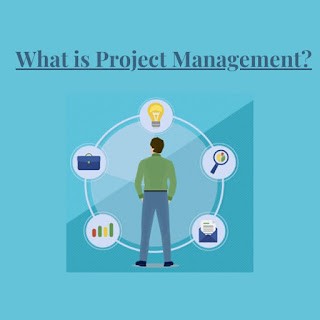Introduction
Have you ever wondered, why does your organization project sometimes feel off? Are you able to achieve the deadline on time? Have you ever thought is your project impactful or achieve its main objective? If you feel that the last two questions are ‘no’, then you might need to do a project management maturity self-assessment test. The purpose of this article is to encourage you to equip yourself with Project Management Skill. How are we going to achieve that? Don’t worry, we will guide you throughout the article. (Project Management Academy, 2024)

What Is Project Management?
Project management is a systematic process that enables project managers to effectively plan, execute, track, and complete projects with the support of a dedicated project team. To accomplish this, project managers must employ project management principles, skills, methodologies, and tools to guide team members through each stage of the project lifecycle. The project lifecycle typically consists of phases such as initiation, planning, execution, monitoring and controlling, and closure. Throughout these phases, project managers are responsible for defining project objectives, allocating resources, managing risks, and ensuring timely delivery of project outcomes. (Project Management, n.d.)
Whether it’s catalyzing sustainability initiatives or leading the creation of your cherished open-world video games, project management is the dynamic force that drives progress.
Project management involves the strategic application of knowledge, skills, tools, and techniques to project activities, ensuring they align with project requirements. It encompasses the meticulous planning, efficient organization, and precise execution of tasks necessary to transform abstract concepts into concrete products, services, or deliverables. From conception to completion, project management orchestrates the journey from vision to reality. (Project Management Institute, n.d.)

What Will You Learn?
Create a project statement
In a project management course, participants will acquire comprehensive knowledge and practical skills essential for successfully planning, executing, and managing projects. Through interactive learning modules, they will master project planning, scheduling, budgeting, risk management, and stakeholder communication. Additionally, participants will explore diverse project management methodologies and tools to enhance their ability to lead teams and ensure project success. By the end of the course, participants will be equipped with the expertise and confidence needed to deliver projects efficiently, effectively, and with maximum impact.”
Define project objectives
Defining project objectives involves clearly outlining the specific, measurable outcomes that the project aims to achieve within a defined timeframe. These objectives serve as the guiding principles for the project, providing a clear direction and focus for all project activities. Effective project objectives are SMART: Specific, Measurable, Achievable, Relevant, and Time-bound. They should align with the overall goals of the organization or stakeholders and provide a basis for evaluating project success. By defining project objectives, project managers ensure clarity, alignment, and accountability throughout the project lifecycle.
Resources Management
Resource management in project management involves efficiently allocating available resources, including human, material, and financial resources, to meet project objectives within specified constraints. This entails planning, acquiring, allocating, and monitoring resources throughout the project lifecycle. By identifying resource requirements, acquiring necessary resources, and optimizing their utilization, project managers ensure that projects are completed on time, within budget, and to the required quality standards. Effective resource management is crucial for maximizing productivity, minimizing costs, and achieving project success. It requires careful planning, proactive monitoring, and agile decision-making to adapt to changing project needs and optimize resource allocation.
Financial management plan
Financial management planning in project management involves strategically planning, monitoring, and controlling project finances to ensure adherence to budgets and financial goals. This entails budgeting, cost estimation, and cost control to manage expenses effectively. Financial reporting provides stakeholders with insight into project finances, while procurement management ensures cost-effective sourcing of goods and services. Risk management identifies and mitigates financial risks, while stakeholder communication fosters transparency and alignment. Effective financial management enables efficient allocation of resources, minimizes costs, and maximizes ROI, ensuring project success within financial constraints. It requires meticulous planning, monitoring, and communication to achieve financial objectives.
Action plan
An action plan in project management outlines specific tasks, timelines, responsibilities, and resources needed to achieve project objectives. It serves as a roadmap for project implementation, guiding team members through each step of the project lifecycle. Action plans break down larger project goals into manageable actions, helping to prioritize tasks, allocate resources efficiently, and track progress effectively. By clearly defining action items and deadlines, action plans facilitate coordination and collaboration among team members, ensuring that projects stay on track and are completed successfully. They provide a structured approach to project execution, enabling teams to overcome challenges and deliver results within established timelines and budgets.
Project implementation
Project implementation in project management refers to the execution phase where the project plan is put into action. It involves coordinating resources, tasks, and activities according to the project schedule and budget. During implementation, project managers oversee team members, monitor progress, and address any issues or obstacles that arise. Effective communication and collaboration are essential to ensure alignment and efficiency throughout the implementation process. By following the project plan and adapting as needed, project teams work towards achieving project objectives and delivering the desired outcomes within the specified time frame and budget constraints.
Evaluate and step to evaluate project success
Evaluation in project management involves assessing the project’s performance against predefined criteria to determine success. Steps include defining success criteria, collecting data, analyzing performance, comparing against criteria, identifying lessons learned, communicating results, and adjusting for improvement. Success criteria may encompass meeting project objectives, adhering to schedules and budgets, delivering quality outcomes, and stakeholder satisfaction. By systematically evaluating projects, teams can identify strengths, weaknesses, and areas for improvement, enabling continuous enhancement of project management practices and increasing the likelihood of future project success.
(AYO Academy, n.d.)
What Are The Benefits Of Project Management?
Budget and Timelines Management
Tight budgets and timelines challenge project success, intertwined in their impact. A skilled project management team is vital, strategizing to align budgets and timelines with priorities. They adeptly manage resources and personnel, ensuring efficient progress towards objectives within constraints.
Productivity Improvement and Work Quality
All project managers work diligently to define goals and optimize workflows to enhance productivity and project quality. With a clear roadmap, teams navigate the project efficiently, improving task performance and overall work quality, resulting in high-quality products.
Project Risk Mitigation
All projects entail various risks, spanning from costs to schedules to performance. Analyzing, communicating, and prioritizing project risks are areas where project managers excel, supporting their organization. With a dedicated project management team, risks can be mitigated before they cause lasting damage to the project, or worse, to the company.
Stakeholders Relationship Improvement
Working with a variety of stakeholders, from investors and executives to suppliers and vendors, can sometimes feel overwhelming due to conflicting interests.
Creating a core project management team can streamline communication among stakeholders, manage mutual risks, and enhance the organization’s relationships. A project manager must acknowledge the needs of each stakeholder to ensure project outcomes align with goals.
(Simplilearn, 2024)
Tips or Additional Notes
List everything you need to do and organize everything:
Add deadlines or due dates, titles, status or links to relevant files. Put it in a calendar or a simple list. You have to organize it so it’s easy for others to understand then circulate among your stakeholders
Communicate clearly:
Communication is key when it comes to ensuring everyone understands tasks and projects. Make sure they understand the task and responsibilities clearly.
Regularly share status updates:
Everyone now knows what their responsibilities are so now you have to keep on monitoring them through updates to ensure that everything goes smoothly. This will also encourage and motivate your stakeholders.
Share your goals and assess why you are launching this project
You have to have a clear goal on why you are doing this project. Who will benefit from the project and what are the impacts? Share them with your stakeholders, by conducting meetings and so on.
Provide opportunities for feedbacks:
This is to ensure that the plan has to work for everyone and to ensure that all stakeholders are aligned.
(Martins, 2024)
Conclusion
In conclusion, project management is an indispensable discipline for achieving organizational success. Through effective planning, execution, and evaluation, project managers navigate challenges, optimize resources, and deliver high-quality outcomes. By aligning budgets and timelines, mitigating risks, and fostering stakeholder relationships, project management drives productivity, innovation, and growth. With clear communication, goal alignment, and continuous feedback, projects can be efficiently managed to meet objectives and exceed expectations. Embracing project management principles empowers organizations to thrive in dynamic environments and achieve their strategic goals.
References
AYO Academy. (n.d.). Project Management – Thrive Together Training. AYO Academy. Retrieved May 14, 2024, from https://ayoacademy.org/courses/project-management-2/
Martins, J. (2024, 2 3). What is Project Management and its Benefits? [2024] • Asana. Asana. Retrieved May 14, 2024, from https://asana.com/resources/benefits-project-management
Project Management. (n.d.). Project Management: What Is Project Management? ProjectManager. Retrieved May 14, 2024, from https://www.projectmanager.com/guides/project-management
Project Management Academy. (2024). Project Management Maturiy- Where Does Your Organization Fall? Wikipedia. Retrieved May 14, 2024, from https://projectmanagementacademy.net/articles/project-management-maturity/
Project Management Institute. (n.d.). What is Project Management, Approaches, and PMI. PMI. Retrieved May 14, 2024, from https://www.pmi.org/about/what-is-project-management
Shoaib Ulfat. (2023, March 19). “Project Management 101: Essential Tips for Beginners”. LinkedIn. Retrieved May 14, 2024, from https://www.linkedin.com/pulse/project-management-101-essential-tips-beginners-shoaib-ulfat
Simplilearn. (2024, 1 30). What are the Benefits of Project Management? Simplilearn.com. Retrieved May 14, 2024, from https://www.simplilearn.com/benefits-of-project-management-article
